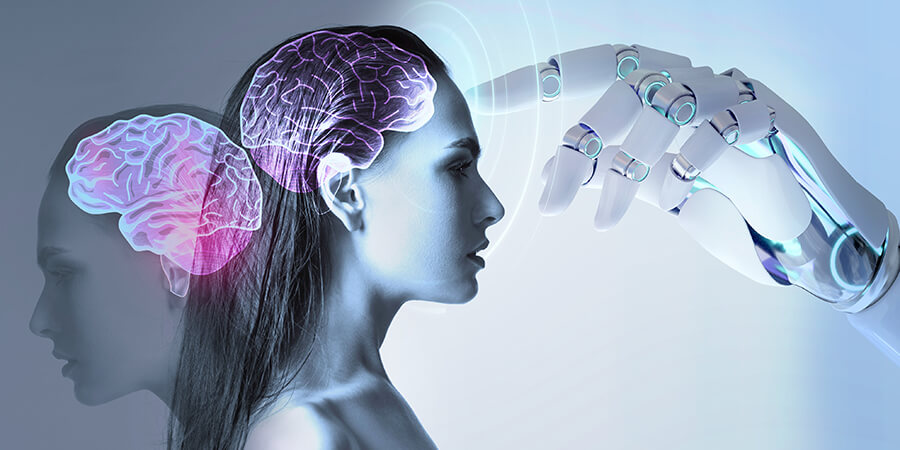In recent years, artificial intelligence has emerged as a powerful tool in various fields, and mental health care is no exception. With its ability to analyze vast amounts of data, identify new patterns and make predictions, AI holds tremendous promise for transforming the way we understand, diagnose and treat mental health conditions. There are a lot of exciting possibilities that AI brings to the table: it can enhance diagnostic accuracy, enable personalized treatment approaches and even provide timely interventions. However, we must also acknowledge the challenges and ethical considerations that arise when integrating AI into mental health care.
Opportunities for Integrating AI for Mental Health Care
The integration of AI in mental health care presents a myriad of opportunities that have the potential to revolutionize the field. Here are some key opportunities associated with harnessing the power of AI in mental health care:
- Enhanced diagnostic accuracy: AI algorithms can analyze vast amounts of data, including medical records, genetic information and behavioral patterns, to assist in more accurate and timely diagnoses. This can lead to early identification and intervention for individuals at risk of developing mental health disorders.
- Personalized treatment approaches: AI algorithms can analyze individual patient data, including symptoms, genetics and treatment history, to provide tailored treatment plans. This personalized approach can optimize treatment effectiveness and minimize adverse effects.
- Early detection and intervention: AI-powered tools can monitor and analyze user-generated data, such as social media posts and smartphone usage patterns, to detect early signs of mental health deterioration. With early detection, timely interventions can be implemented to prevent the escalation of mental health concerns.
- Accessible mental health support: AI technologies, such as chatbots and virtual assistants, can provide accessible and immediate mental health support to individuals in need. This can help bridge the gap between the demand for mental health services and the limited availability of mental health professionals.
- Data-driven insights for research and policy-making: AI can analyze large-scale datasets to identify trends, risk factors and treatment outcomes, providing valuable insights for research and policy-making in the field of mental health care. This can lead to evidence-based practices and improved resource allocation.
While the opportunities are promising, it is crucial to address challenges such as ethical considerations, data privacy and ensuring human oversight to maintain the ethical and responsible integration of AI in mental health care.
Addressing Challenges in Integrating AI for Mental Health Care
The integration of AI in mental health care is not without its challenges. Notably, ethical concerns arise, encompassing issues of privacy, data security and the potential for bias in algorithms. Furthermore, the lack of human touch in AI interventions may hinder the vital human connection and empathy necessary for effective mental health care, potentially impacting patient trust and engagement. Limited data availability poses another obstacle, as AI models require extensive, high-quality data to be trained accurately, yet mental health data is often limited, fragmented and sensitive. This limitation can make it challenging to develop precise AI algorithms for mental health care.
Diagnostic accuracy is also a challenge, as AI algorithms may struggle to definitively diagnose complex mental health conditions, relying heavily on available data and potentially failing to capture the full complexity of individual experiences.
Additionally, AI models developed in one population or setting may not generalize well to other populations or cultures, leading to biased or inaccurate predictions and recommendations. Legal and regulatory considerations further complicate the integration of AI in mental health care, raising issues of liability, accountability and compliance with privacy and data protection laws. Striking the right balance between human expertise and AI assistance is crucial, as human-AI collaboration should enhance human capabilities rather than replace human clinicians, fostering a collaborative approach.
Access and equity are also concerns, as the potential for AI to improve mental health care may be hindered by the digital divide and disparities in technology reach and availability, exacerbating existing inequalities. User acceptance and trust are important factors, as patients and clinicians may question relying on AI for mental health care, fearing misdiagnosis or misinterpretation and potentially feeling a loss of the human connection. Lastly, continuous monitoring and improvement of AI models in mental health care is essential to ensure their accuracy, effectiveness and safety, necessitating ongoing research, development and resources.
In conclusion, the potential for AI to improve diagnosis and treatment in the field of mental health is promising. AI technologies can assist in the early detection and accurate diagnosis of mental health disorders by analyzing large amounts of data and identifying patterns that may not be easily recognizable by humans. Additionally, AI-powered virtual assistants and chatbots can provide personalized and accessible mental health support to individuals, offering them a safe space to express their feelings and receive guidance. However, it is important to approach the use of AI in mental health with caution, ensuring ethical considerations, privacy protection and the involvement of trained professionals in the decision-making process. Overall, AI has the potential to revolutionize mental health care by augmenting human expertise and improving access to timely and effective interventions.
